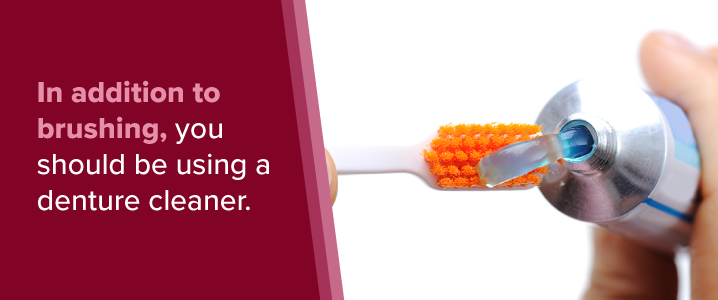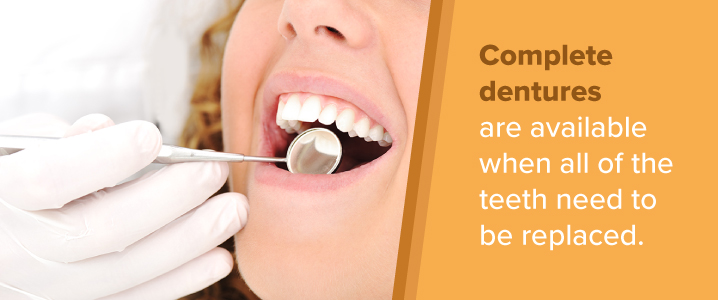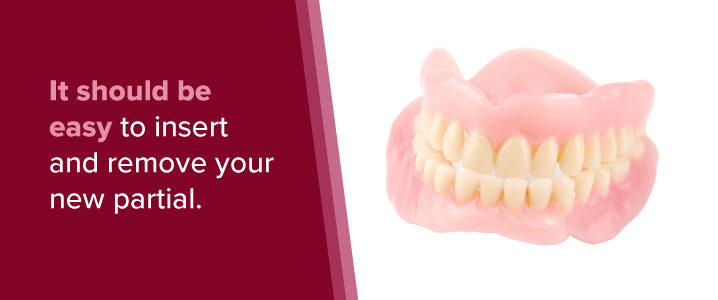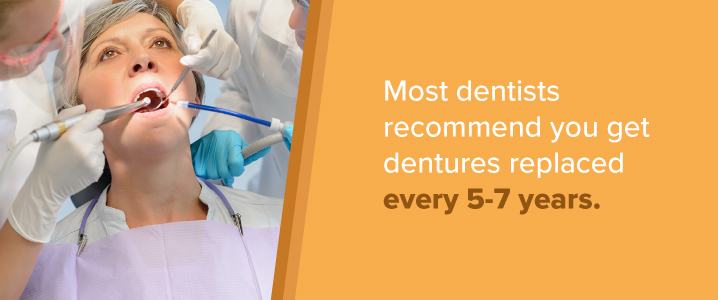Maybe you have missing teeth or are finding it difficult to chew. You may already have dentures or be considering getting dentures in Yuma, AZ. Dentures can fill in the gaps between missing teeth, whether you’re missing just a few teeth or an entire row. And the dentures that are popular today are much more modern than those from previous years and are considered to be medical devices that are specifically designed to fit you.
Since dentures can last for many years if properly cared for, you may be wondering what’s the very best way to care for your dentures. Should you be focused on the advertisements and coupons that tell you their product used by itself is the very best for denture cleaning? Or should you consult your dentist about which method of cleaning you should be using, depending on the type of dentures that you have?
Table of Contents
Basic Care for Your Dentures and Maintaining Your Overall Oral Health
Proper denture care in Yuma, AZ is essential. Dentures, much like your natural teeth, need to be brushed daily. It’s also important to rinse out food particles that get stuck in dentures after each meal. When brushing, use a non-abrasive toothpaste and a soft brush to ensure that your dentures are not scratched. In addition to scratching your dentures, whitening toothpastes should not be used, because those same abrasives can cause an unhealthy buildup on your dentures.
Other care tips for your mouth and dentures include:
- To ensure that you have good oral health, don’t forget to brush the top of your mouth, your gums and your tongue. Brushing in these areas will help remove the plaque that may be trapped there.
- In addition to brushing, you should be using a denture cleaner. You may even use hand soap to clean your dentures or even a mild dishwashing liquid. Bleach should not be used as a cleaner because it can actually change the color of the pink part of the dentures and make it white.
Some people even like to use ultrasonic cleaners to clean their dentures. These cleaners are small tubs where ultrasonic waves are emitted while the dentures are submerged in water. The ultrasonic waves clean the dentures but do not replace the need for brushing as well. Remember that it’s important to use products that have been recommended for denture cleaning by the American Dental Association (ADA), as they have been thoroughly evaluated.
And don’t forget to thoroughly rinse your dentures before placing them back into your mouth. A number of denture cleaners contain chemicals that could be harmful to you, possibly causing burns or even vomiting if they are not removed.
- After cleaning dentures, don’t put them back into your mouth for the night. It’s important to give your mouth a rest. And in order to prevent your dentures from drying out and losing shape, they should always be kept moist. Place them in a solution used to clean dentures, or just in water. If you have metal attachments for your dentures, you may want to use plain water, since the metal can tarnish if left in the denture cleaning solution for a long period of time.
Regardless, you want to avoid putting the dentures in hot water, as they will likely warp. Soaking your dentures will also help in the removal of plaque and stains.
- Remember to carefully handle your dentures, as you don’t want them to fall and crack or have the clasps bend while you’re cleaning them. If you’re handling your dentures, stay near a sink filled with water or lean over a folded towel so that, if you drop your dentures, they are less likely to suffer damage. Any misshape in your dentures may make them more difficult to fit into your mouth.
Though your dentist may be able to remedy this with an adjustment, it’s not always an easy or quick fix. Your dentist is always your best resource for making adjustments to your dentures, so don’t try to make these adjustments yourself, as improperly fitting dentures can cause not only irritation, but also infection.
- Even if you have no teeth, but have replaced your teeth completely with dentures, you still need to see your dentist on a regular basis. Only your dentist can determine how frequently you need to visit to have your dentures cleaned by a professional and make sure they fit properly to maximize comfort and benefit to you. Your dentist will also be able to look at your mouth to see that it is healthy and free from disease.
- As mentioned above, make sure to keep your dentures moist! Should you know you need to store your dentures for a long period of time, consult your dentist on how best to store them.
Reasons for, and Types of, Dentures
A variety of factors may result in the need for dentures. People may have missing teeth because of tooth decay, trauma to the tooth or from defects that are genetic in nature. Gum disease can also result in missing teeth. Dentures made to replace these missing teeth are manufactured from materials such as porcelain, because of its similarity to tooth enamel, and from acrylic resins, because of the durability and long-wear.
Though all types of dentures need to be kept clean, there are various types of dentures. Traditionally, dentures can’t be placed into your mouth until your mouth has had time to heal following tooth extraction. Typically, that means you will be without teeth during the six- to eight-week period while your gums heal. And because some people don’t like to wait while their mouth heals, if they opt for dentures other than the traditional variety, sometimes the dentist will need to make more adjustments during the period where the mouth heals due to shrinking tissue.
There are various types of dentures that fit different needs. The different types of dentures available include:
- Complete dentures are available when all of the teeth need to be replaced. They are placed in the mouth following the extraction of the teeth and healing of the bone and gum.
- Immediate dentures are available to be placed into your mouth immediately following the extraction surgery. While you won’t be without teeth during the healing of the bone and gums of your mouth following teeth extraction, you may need to have multiple adjustments of your dentures during that healing period. The tissue of your mouth and gums will shrink as the healing process takes place.
- Overdentures are another type of denture where the denture will fit over your remaining teeth or implants. This may be a good option for some people, but can only be determined through consultation with our dentist, who can help you decide on the best option for you.
- Partial dentures are dentures that are designed to take the place of some missing teeth. They attach to remaining natural teeth with tiny clasps that are made of metal. They come in several types, including the cast metal partial that consists of a frame made from metal, to which teeth are then attached.
A flexible partial is different in that it’s made from a unique material that adds to the comfortable fit. The most affordable of the partial denture is the acrylic partial, which has a base that’s made from acrylic. Like the cast metal partial, the acrylic partial has metal clasps. The downside to this type of partial is that it tends to be bulkier than the cast metal partial.
Reasons for, and Types of, Dentures
If your dentures are not fitting properly in your mouth, you’ll be able to tell, as they will be very uncomfortable. It’s important that you let your dentist know before you leave their office so they can ensure a proper fit. If your dentures are not fitting properly, they can cause serious medical conditions. With ill-fitting dentures, you should always make an appointment with your dentist as soon as possible so they can adjust your dentures to avoid any of these medical conditions.
- Stomatitis is a condition in which there’s a general amount of inflammation in the mouth. This inflammation is likely to occur in areas around the mouth, gums and tongue. It often results from improperly fitted dentures, or from mouth canker sores. Usually, this condition is more painful than serious, but it may be cause for concern, as it could indicate a serious underlying condition.
- Angular cheilitis is another condition that’s more serious and is a result of the corners of your mouth cracking and splitting. This often occurs when there is excessive drool if your dentures aren’t fitting properly. More serious cases of angular cheilitis will exhibit blisters that won’t heal, even with over-the-counter medication. This condition can become so painful that it may be difficult to open your mouth to talk or eat.
What to Expect if you Choose to Wear a Partial Denture
After weighing all of your choices and learning the best way to care for your dentures, you have decided that you will ask that your dentist fits you with partial dentures. But how do you know if they’re really fitting properly when you leave the office? Or is the discomfort you’re experiencing merely a result of getting accustomed to your new device?
- It should be easy to insert and remove your new partial. If you feel as though you need to bite down in order to force your partial into place, it probably isn’t adjusted correctly.
- Though the partial may seem bulky when you first put it in your mouth, this is normal, and you will eventually get used to wearing it.
- Always follow the instructions your dentist gives you about how long you should wear your partial and when you should remove it.
- If you feel as though the partial is putting a lot of pressure on any particular area in your mouth, and you begin developing a sore spot, see your dentist so they can adjust the partial.
- You will eventually become accustomed to eating with the partial in your mouth, but it will take some time and gradual adjustments. Start out by eating softer foods and gradually progressing to harder foods. You may want to avoid especially sticky foods or gum while you’re getting used to your partial.
As you get older, your mouth will change. That’s why it’s important to see your dentist for regular checkups so that he can complete the necessary adjustments to your partial. Do not attempt to repair a cracked partial yourself. Companies that manufacture and repair partials know exactly which materials should be used on partials so that they’re not introducing any toxic substances into the mouth.
Basic Questions About Dentures
Now that you have some idea about the proper care of dentures and the types of dentures available, you may have some basic questions about dentures.
-
- How long should I expect my dentures to last?Though dentures may last as long as 30 years in rare circumstances, most dentists recommend you get your dentures replaced every five to seven years. Dentures can get worn out due to normal use, and the shape of you mouth may change as you age. By carefully caring for your dentures, you can increase your chances of them lasting longer.
- Will I need to use a fixative bonding material in order to keep my dentures in place?This is usually only a problem for people who have been wearing dentures for a long period of time, as they can become looser over time. That’s why it’s important to see your dentist regularly so they can make adjustments if necessary.
- Are there any substitutes or alternatives to dentures?Yes, there are alternatives to getting dentures. You can use dental implants to replace one or more of your teeth, which is becoming a more common solution. Implants are surgically implanted into your jaw, and can only be removed by a dentist or periodontist. While implants are very effective, they also cost more than dentures and are not the right solution for everyone.
Where Should I Go for All My Dental needs?
For proper denture care in Yuma, AZ, you should see the dentists at Yuma Dental. Our caring and expert staff knows that getting complete dentures will not only improve your appearance by providing support to your facial muscles, but can also make a meaningful impact on your quality of life.
What sets Yuma Dental apart from other dentists is that we try to make the experience of getting dentures both easy and comfortable. We will work with you to make sure you have dentures that suit your individual needs, in addition to providing you with information on how to care for your new dentures.
And the Yuma, Arizona dentists at Yuma Dental will also advise you on proper denture care, denture cleaning, and denture care tips to make sure your dentures will last for years to come.
Yuma Dental also fits patients with dental bridges. If you are missing teeth and are in need of either a fixed or removable bridge, our dentists will be able to assist in tooth restoration to make a bridge out of gold, porcelain, metal alloys, or a combination of those.
To get an appointment with Yuma Dental, where the experienced dentists in Yuma, Arizona can assist you with fitting dentures as well as routine denture care, cleaning and proper denture storage, contact Yuma Dental today.

















